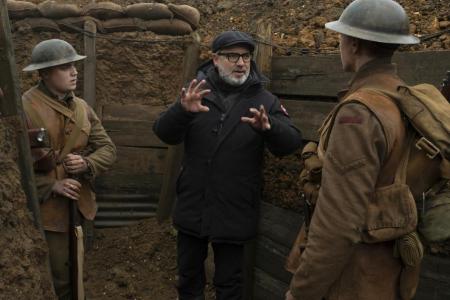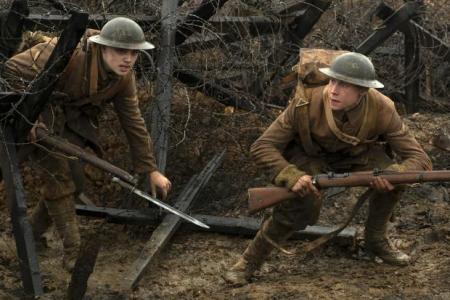Mendes: Shooting one-take 1917 was a 'holiday' compared to Bond films
NEW YORK – After the juggling act of two Bond films, Skyfall and Spectre, with their cadre of characters and armory of gadgets, Sam Mendes had something cleaner and more linear in mind for his next film.
Two main characters. No backstory. Real time. And one shot.
From the start, the Oscar-winning English director envisioned his 1917 as unfolding continuously and breathlessly.
In the British trenches of World War I, two soldiers (George MacKay and Dean-Charles Chapman) are tasked with delivering an urgent message to another battalion to stop an attack, planned for the next morning, that’s doomed to fail.
The German troops appear to have retreated, but it’s a trap.
Mendes follows their harrowing journey without blinking, hiding any edits to give the impression of a ceaseless and fluid film.
1917, which recently won Best Picture - Drama and Best Director at the Golden Globe Awards, opens here on Jan 9.
For the 54-year-old, it’s an especially bold enterprise, one that extends the cinematic history of the long take into a new realm.
He said: “Even though this was ambitious and tiring in its own way, it’s not nearly as ambitious as shooting on five continents and 20 cameras and all that stuff that goes with Bond.
“Even though there were hundreds of people (in 1917), it was about a war, only one camera, two central characters and a single linear narrative, and just one two-hour period in real time of one day in 1917. It felt like a holiday compared to Bond.”
You opened Spectre (2015) with a great long take. Is that when you started thinking about more elastic ways to shoot?
That was one I was really proud of and enjoyed as well. I loved the process of doing it. It asks you to think of the multiple ways a camera can tell a story that are not close-up, close-up, over-the-shoulder, over-the-shoulder, two-shot, push-in through the door. I found myself quite quickly defaulting to standard ways of telling a story. Just coverage, coverage and more coverage. The challenge here was to make it on the day and not in post. You feel like everyone’s making it on the day because everyone knows there’s no way out of this. This is the movie. And every single member of every department is engaged on every shot. Normally, it’s like, “Well, we’re in close-up so special effects can go have some breakfast. And now we’re on a shot of a building blowing up, the hair and make-up isn’t so important.” But here, everyone was engaged in every second of the film. It happened at the beginning of Spectre. Everyone was maxed out, and I love that feeling.
Were you concerned that it could come off like a gimmick?
We experience life as a single shot. We go through life with one unbroken take. It’s editing that’s the gimmick. Editing is a wonderful tool if you want to jump time, jump space, jump from one story to another. But editing is so overused in just a basic scene. You and me talking, we would have already used five or six different set-ups. You have to ask yourself: Why is that now our default?
How extensive was the rehearsal?
The difference between this and a normal movie is that the actors started prep with the crew. We couldn’t build anything or judge anything until we had physically rehearsed the journey we were going to take. Everything started on empty fields with scripts in hand, planting flags for the trenches and no man’s land. This is the distance, this is where the trenches cross. Then you extrapolate that onwards through vast areas of land. Only then could we start digging the trenches, and we dug over a mile of trenches and filled them with people. Every step of the journey was accounted for.
1917 is inspired by and dedicated to your grandfather, Alfred Mendes, who was a runner in WWI. What prompted you to return to him now?
The winds that were blowing before the First World War are blowing again. It was 100 years ago almost to the day that I started writing. The danger is that war is being gradually forgotten. Those that lived through it and fought in it are dead. These men were fighting for a free and unified Europe, which right now would be worth remembering in my country, perhaps. So, there is a sense there’s something unsettled in the air, the shifting of borders, the obsession with nation over universal good. I thought it was time to be reminded of that and also make a movie that’s not defined by its nation. It’s about the human experience of war. - AP/REUTERS
Get The New Paper on your phone with the free TNP app. Download from the Apple App Store or Google Play Store now




